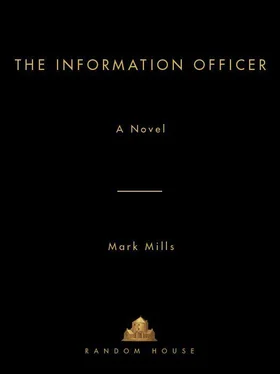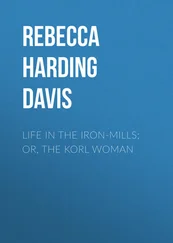Mark Mills - The Information Officer
Здесь есть возможность читать онлайн «Mark Mills - The Information Officer» — ознакомительный отрывок электронной книги совершенно бесплатно, а после прочтения отрывка купить полную версию. В некоторых случаях можно слушать аудио, скачать через торрент в формате fb2 и присутствует краткое содержание. Жанр: Старинная литература, на русском языке. Описание произведения, (предисловие) а так же отзывы посетителей доступны на портале библиотеки ЛибКат.
- Название:The Information Officer
- Автор:
- Жанр:
- Год:неизвестен
- ISBN:нет данных
- Рейтинг книги:5 / 5. Голосов: 1
-
Избранное:Добавить в избранное
- Отзывы:
-
Ваша оценка:
- 100
- 1
- 2
- 3
- 4
- 5
The Information Officer: краткое содержание, описание и аннотация
Предлагаем к чтению аннотацию, описание, краткое содержание или предисловие (зависит от того, что написал сам автор книги «The Information Officer»). Если вы не нашли необходимую информацию о книге — напишите в комментариях, мы постараемся отыскать её.
The Information Officer — читать онлайн ознакомительный отрывок
Ниже представлен текст книги, разбитый по страницам. Система сохранения места последней прочитанной страницы, позволяет с удобством читать онлайн бесплатно книгу «The Information Officer», без необходимости каждый раз заново искать на чём Вы остановились. Поставьте закладку, и сможете в любой момент перейти на страницу, на которой закончили чтение.
Интервал:
Закладка:
“In the middle of all this?”
“No point in hanging about once the decision’s been made. Thanks for everything, amigo, and adios.”
“Who’s replacing him?”
Elliott smiled. “You don’t expect me to hand you everything on a plate, do you?”
“No, although a piece of fish would be nice, before it’s cooked to buggery.”
They ate the fish with a simple salad of tomatoes so sweet that it suddenly made sense why they were classified as a fruit rather than a vegetable.
“I’ve been doing all the talking,” said Elliott. “Time for a bit of quid pro quo.”
“You really think I have anything up my sleeve to match what I’ve just heard?”
“I was talking about you. Tell me something about Max Chadwick that I don’t already know.”
“There’s a whole load of stuff you don’t know.”
“Don’t be so sure; I’ve read your file.”
“There’s a file on me?”
“You’re the information officer in a key theater of war. What do you think? I even know the name of your housemaster at Wellington.”
“Old Arsebreath?”
Elliott laughed. “That’s a level of detail it doesn’t go into.”
It came pretty close, though. Apparently Max had been described as “coming from a good family.”
“Well, that’s rubbish, for a start,” he protested. “My great-grandfather made a lot of money sending coal miners to their deaths. His son was a drunk, a bully, and a bigamist who never did an honest day’s work in his life.”
“A bigamist?”
“Well, maybe not technically, but he led a double life with another woman and other children.”
“And his son?”
“My father? He’s proof that the apple doesn’t always fall close to the tree.”
“Good on him,” said Elliott. “And that’s from a man who also had a bully for a father.”
Elliott already knew that Max’s mother had died when he was young. He didn’t know that she’d died in labor, giving birth to Max.
“There—something you didn’t know about me.”
“Doesn’t make the grade. I want something more personal.”
Max thought on it. Then he told Elliott about the letter his mother had written him.
It was a common enough practice, certainly for women like his mother, whose narrow hips weren’t best suited for bringing babies into the world. The doctor had warned her that it would be a difficult birth, that she might have to choose between herself and the child. She had chosen Max, and she had survived long enough to hold him in her arms before the loss of blood had killed her. Sometimes he saw himself spread-eagled on her chest, worn out from all the effort, as she slowly slipped away into oblivion. That’s how it had been, apparently; his father had told him so.
His father hadn’t told him about the letter she’d written to him, her unborn child—well, not until Max was sixteen. He’d found it long before then, though, hidden in his father’s desk, biding its time. The desk had always held a deep fascination for him, with its inlaid mother-of-pearl decoration and its drawers and pigeonholes stuffed with detritus from the world of adults. It was an irresistible Aladdin’s cave for a young boy, and whenever the coast was clear, he would go and poke around in it.
He found the letter tucked away with some other correspondence in a leather portfolio. It wasn’t sealed, and at first he was unsure what he was reading. Not long after, when he was packed off to boarding school near Oxford, he took the letter with him, a guard against loneliness. It had worked. The disembodied voice of his mother—recorded in her distinctive handwriting, with its looping p’s and g’s and y’s—had blunted his sense of isolation. She’d been with him, watching over him.
It was a long letter, and in it she spelled out the story of her life, everything from her childhood in the countryside near Versailles to the comical first encounter with his father in the lobby of the apartment building in Paris. She went to great pains to say that he (although she used the neutral “you” throughout) was the product of a fine and fulsome love affair, and she signed off with a line of French that made no sense to him whatsoever.
Had his French teacher been some creaky old chap in a tweed jacket, he probably wouldn’t have sought him out and asked for a translation. Mademoiselle Leckford, as Lucinda was known, had offered an altogether different prospect. She was young and pretty, and all the boys were a little in love with her. Max copied out the line on a piece of paper, which he presented to her after a class: Tu aurais été ma vie
She scrutinized it a moment before asking, “Where does it come from?” Seeing that the question unsettled him, she quickly added, “You don’t have to say.”
But he told her anyway. It was good to have the excuse to tell someone about his mother and the letter she had written him, especially someone like Mademoiselle Leckford.
“It means …,” she said softly, peering down at him with a strange look in her eyes. “It means, ‘You would have been my life.’”
“Oh.”
She turned away, staring out the window. “Now run along, Chadwick.”
Only later did he learn that she had turned her back on him because she hadn’t wanted him to see the tears building in her eyes.
Of course, the pity felt by an adult for a ten-year-old boy could hardly be dignified with the name of friendship, but it had nonetheless been the start of something enduring and important for both of them.
“I still see her,” said Max, speaking of Lucinda. “And maybe I’m still a bit in love with her.”
“That’ll do me,” Elliott replied. “I like that. It’s a good story. Very revealing.”
“If you say so.”
“Oh, I do.”
Only when the plates were cleared away did they broach the subject they both knew they’d been avoiding, and it was Elliott who took the initiative.
“Recovered from the meeting yesterday?”
“Oh, that’s what it was. Seemed more like a court-martial to me.”
“From where I was sitting too.”
“Where exactly were you sitting?”
Elliott leaned back in his chair. “Put it this way: I can see both sides.”
“You think I can’t? You know what I did when Freddie first showed me the shoulder tab?”
“No, but I can guess. You thought about getting rid of it.”
Max was momentarily thrown by the response. “And what would you have done?”
“Same as you, probably—thought about it, changed my mind, snooped around a bit. The only difference is, I wouldn’t have got caught.”
“Well, bully for you.”
Elliott shrugged the comment aside. “I’m trained for that kind of thing. You’re an architect with a gift for writing the kind of upbeat bullshit that people want to hear at times like this.”
“If you’re trying to put me in my place, you’re doing a pretty good job—better than Colonel Gifford, even.”
“Gifford’s about as subtle as an anvil. I told him you couldn’t be strong-armed.”
“Well, he proved you wrong.”
“Did he? I doubt it. My guess is you’ve thought about nothing else since then … and what you’re going to do about it now.”
“What do you care?” said Max warily.
“You think I’m completely without principles?”
It was a typical play from Elliott, answering a question with a question. Nevertheless, Max reached into his hip pocket and pulled out a folded piece of paper. Elliott took it from him, angling it at the light from the candles.
Max had scribbled three questions on it: Where does he find them? Where did he take Carmela Cassar? Why does he do it? He had put a line through the last of these.
Читать дальшеИнтервал:
Закладка:
Похожие книги на «The Information Officer»
Представляем Вашему вниманию похожие книги на «The Information Officer» списком для выбора. Мы отобрали схожую по названию и смыслу литературу в надежде предоставить читателям больше вариантов отыскать новые, интересные, ещё непрочитанные произведения.
Обсуждение, отзывы о книге «The Information Officer» и просто собственные мнения читателей. Оставьте ваши комментарии, напишите, что Вы думаете о произведении, его смысле или главных героях. Укажите что конкретно понравилось, а что нет, и почему Вы так считаете.










